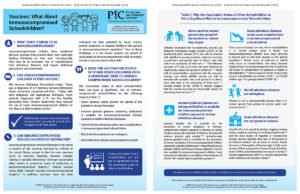The updated document presents five reasons why the vaccination status of other schoolchildren is not a significant risk to immunocompromised schoolchildren
NEWPORT BEACH, CALIF., March 28, 2022 (Newswire.com) –
Physicians for Informed Consent (PIC), an educational nonprofit organization focused on science and statistics, has released an update to its information statement entitled “Vaccines: What About Immunocompromised Schoolchildren?” Developed as a concise, two-page educational brief, the document includes new information about COVID-19 and COVID-19 vaccines, and addresses the common question, “Is it a health risk to immunocompromised kids if other schoolchildren are not vaccinated?”
A safe environment for all people, including schoolchildren, is the goal of everyone involved in public health. Because immunocompromised schoolchildren are among the most vulnerable children in school, this educational document focuses on concerns about their safety, and provides key scientific data about infectious diseases, and the effects and limitations of vaccination. Importantly, the document (referenced here) shows five reasons why the vaccination status of a child is not a significant risk to other classmates in general or immunocompromised schoolchildren in particular. For example:
- Some vaccines cannot prevent the spread of the bacteria or viruses they target. As such, children vaccinated with the diphtheria, tetanus, and pertussis (whooping cough) vaccine (DTaP) or the inactivated polio vaccine (IPV) can still be infected with diphtheria-causing bacteria, pertussis bacteria, or poliovirus and spread them to others, even with mild or no symptoms of their own. The influenza vaccines (TIV and LAIV) have not been observed to significantly reduce the spread of influenza. About half of schoolchildren vaccinated with the measles, mumps, and rubella (MMR) vaccine can still be infected with measles virus and spread it to others, even with mild or no symptoms of their own. And several studies of the COVID-19 vaccine suggest that the vaccine has had no measurable impact on preventing transmission.
- Not all infectious diseases targeted for vaccination are contagious. For example, tetanus cannot spread from person to person under any circumstances. Consequently, a child’s vaccination status for a non-contagious disease does not pose a risk to immunocompromised schoolchildren.
- Some infectious diseases are not spread in schools. For example, the main routes of hepatitis B transmission are sexual contact, injection drug use, and being born to an infected mother — routes of transmission that do not occur in school. Nearly all cases of Haemophilus influenzae type b (Hib) occur among children younger than 5 years of age; therefore, nearly all Hib transmission does not occur in school. Human papillomavirus (HPV) is sexually transmitted and is therefore not spread in school.
The Physicians for Informed Consent educational document on vaccines and immunocompromised schoolchildren discusses COVID-19; diphtheria, tetanus, and pertussis (DTaP); polio; influenza (flu); measles, mumps and rubella (MMR); varicella (chickenpox); hepatitis b; Haemophilus influenzae type B (Hib); and human papillomavirus (HPV).
“We’re happy to be able to help parents in this way, when they are researching which vaccines are required for attending school,” said Dr. Shira Miller, founder and president of Physicians for Informed Consent. “And the data indicate that whatever vaccine decisions parents make for their children, those decisions don’t significantly affect other children — even if they are immunocompromised. Thus, informed consent and informed refusal in vaccination are both logical and moral, and there is no justification to mandate schoolchildren receive COVID-19 vaccines, or any other vaccines.”
To read all five reasons why the vaccination status of a child is not a significant risk to other classmates, download your copy of “Vaccines: What About Immunocompromised Schoolchildren?” at physiciansforinformedconsent.org/immunocompromised-schoolchildren. Readers are encouraged to share the document with their physicians, friends and family.
About Physicians for Informed Consent
Physicians for Informed Consent is a 501(c)(3) educational nonprofit organization focused on science and statistics. PIC delivers data on infectious diseases and vaccines, and unites doctors, scientists, healthcare professionals, attorneys, and families who support voluntary vaccination. In addition, the PIC Coalition for Informed Consent consists of over 300 U.S. and international organizations. To learn more or to become a member, please visit physiciansforinformedconsent.org.
Press contact: info@picphysicians.org
###
CLICK HERE to view on Newswire.com
CLICK HERE to view on Facebook
CLICK HERE to view on Instagram
CLICK HERE to view on Twitter
CLICK HERE to view on LinkedIn

